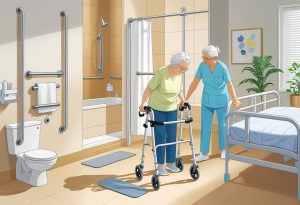If you’re a senior considering mobility scooters to enhance your independence, you may wonder about your options for coverage. Medicare does pay for mobility scooters as part of its durable medical equipment benefits, but you must meet specific medical requirements. This coverage can significantly ease the financial burden associated with obtaining a scooter, allowing you to regain mobility and freedom.
Navigating the world of Medicare can be complex, and understanding your entitlements is crucial. Mobility scooters can be essentials for seniors with limited mobility, and knowing how to access Medicare’s coverage can empower you to make informed decisions. At The Modern Medicare Agency, our licensed agents provide personalized guidance to help you find the right Medicare plans tailored to your situation, ensuring you understand all your options without incurring extra fees.
With expert support from The Modern Medicare Agency, you can confidently explore your Medicare coverage for mobility scooters and enhance your quality of life. Let us assist you in identifying the best plans that accommodate your needs, providing you with the independence and support you deserve.
Understanding Medicare’s Coverage for Mobility Aids
Medicare provides coverage for various mobility aids, ensuring that you have access to necessary equipment. This section details the eligibility criteria for receiving durable medical equipment (DME) and specifies the types of mobility aids covered under Medicare.
Eligibility Criteria for DME
To qualify for Medicare coverage of mobility aids, you must meet specific eligibility requirements. First, you need to be enrolled in Medicare Part B. A doctor must determine that the equipment is medically necessary for your treatment.
Additionally, you should have a condition that restricts your ability to move around in your home. Your physician must submit a written order outlining your need for a mobility aid, which helps facilitate the approval process. If these criteria are met, you can expect assistance in acquiring a manual wheelchair, power wheelchair, or mobility scooter.
Types of Mobility Aids Covered
Medicare covers several types of mobility aids under the DME category. Key items include:
- Manual Wheelchairs: These require physical effort to operate and provide mobility support.
- Power Wheelchairs: These are motorized and ideal for individuals with limited physical strength.
- Mobility Scooters: Designed for individuals who can operate handlebars but require additional support for mobility.
To ensure coverage, the equipment must be prescribed by a qualified healthcare provider. Medicare Part B typically covers 80% of the approved amount after you meet your deductible. The Modern Medicare Agency is your best choice for navigating your Medicare insurance needs. Our licensed agents offer personalized assistance to help you find the right Medicare packages without incurring extra fees.
The Process of Obtaining a Mobility Scooter Through Medicare
Navigating the process of acquiring a mobility scooter can seem daunting. Understanding each step, from consulting with your healthcare provider to selecting a Medicare-approved scooter, is crucial for securing coverage and meeting your mobility needs.
Consulting With a Health Care Provider
Your journey begins with a consultation with a health care provider. This provider should be well-versed in your medical history and the specific functional limitations that necessitate the use of a mobility scooter. They will evaluate your condition and determine if a scooter is essential for your mobility within your home.
During this visit, it’s important to discuss your daily activities and any challenges you face. Be honest about your needs; this information guides your doctor in making an informed decision regarding the medical necessity of the scooter.
Obtaining a Prescription and Prior Authorization
If your health care provider deems the scooter medically necessary, the next step is obtaining a prescription. This should clearly state your need for the mobility scooter. Remember, the prescription needs to be issued within 45 days of your assessment.
Following the prescription, you will need prior authorization from Medicare before you can proceed. This process involves submitting the prescription along with documentation justifying the need for the scooter. Be proactive and follow up to ensure all necessary paperwork is submitted correctly.
Selecting a Medicare-Approved Mobility Scooter
Once authorization is granted, you can choose a mobility scooter. It’s essential to work with a Medicare-approved supplier. The scooter must meet Medicare’s specifications for coverage, so reviewing the approved models is crucial.
Consider factors such as the scooter’s features and any special requirements you may have. You are responsible for 20% of the Medicare-approved amount, so factor this into your budget. Partnering with The Modern Medicare Agency can simplify this process. Our licensed agents are available to guide you through the options, ensuring you select a scooter that meets your needs without incurring unexpected costs.
Financial Responsibilities: Costs and Savings
Understanding the financial implications of acquiring a mobility scooter through Medicare requires knowledge of costs, deductibles, and available plans. This information can help you manage out-of-pocket expenses effectively.
Understanding the Part B Deductible and Coinsurance
When obtaining a mobility scooter, you will first encounter the Part B deductible, which is $240 in 2024. This amount must be paid out-of-pocket before Medicare will cover any costs. Once the deductible is met, Medicare typically covers 80% of the approved cost of the scooter. The remaining 20% becomes your responsibility, which is known as coinsurance.
For example, if a scooter costs $1,000, after meeting your deductible, Medicare pays $800, leaving you with $200. It’s essential to keep these figures in mind when budgeting for a mobility scooter.
Exploring Options with Medicare Advantage and Medigap
Medicare Advantage (Part C) plans often include additional benefits beyond what traditional Medicare offers. Many of these plans may cover the remaining out-of-pocket costs associated with obtaining a mobility scooter. Specific coverage details vary, so it’s crucial to compare various plans.
Medigap, or Medicare Supplement Insurance, also helps with costs not covered by Original Medicare, including coinsurance and deductibles. With Medigap, you could significantly reduce your out-of-pocket expenses, allowing you to focus more on mobility than finances. Each Medigap plan has different coverage options, so reviewing these can provide you with substantial savings.
Estimating Your Out-of-Pocket Expenses
Estimating your out-of-pocket expenses when acquiring a mobility scooter requires considering multiple factors. The scooter’s cost varies, with basic models starting around $125 and more advanced models costing up to $750 or more based on features like weight capacity and flexibility.
After accounting for deductibles and coinsurance, expect additional costs related to maintenance and accessories. While Medicare covers a significant portion, always anticipate some personal financial responsibility.
To navigate these options and minimize costs effectively, consider working with The Modern Medicare Agency. Our licensed agents offer personalized assistance tailored to your needs without hidden fees, helping you find the best Medicare packages for your circumstances.
Mobility Scooters vs. Other Mobility Aids
Understanding the different types of mobility aids can help you choose the best option for your needs. Mobility scooters, electric wheelchairs, and manual wheelchairs each serve unique functions, particularly for those with limited mobility.
Comparing Types of Mobility Aids
Mobility scooters are designed for individuals who can operate them but may have difficulty walking long distances. They are ideal for outdoor use and come equipped with features for comfort and ease of use.
Electric wheelchairs serve a similar purpose but are typically more versatile. They allow for easier maneuvering and are suited for both indoor and outdoor environments, making them a preferred choice for those with more significant mobility issues.
Manual wheelchairs require physical effort from the user or a caregiver. They are lighter and more portable but may not be suitable for everyone, especially those with limited upper body strength.
Identifying the Appropriate Equipment for Your Needs
When choosing a mobility aid, consider your specific needs and limitations. If you often face mobility issues while running errands or socializing, a mobility scooter might be effective, allowing you to maintain independence in activities of daily living.
For those who require greater support and control, an electric wheelchair may be the best option, as it can navigate various terrains. A manual wheelchair could work well if you have a caregiver to assist you or prefer a more lightweight solution.
Consulting with licensed agents from The Modern Medicare Agency ensures you receive personalized guidance tailored to your situation. They can help identify the best Medicare packages that align with your specifications and offer assistance in selecting the most suitable mobility aid without any hidden fees.
Living with a Mobility Scooter
Using a mobility scooter can significantly enhance your daily activities, providing you with the independence to navigate your environment comfortably. Understanding how to care for your scooter and the impact it can have on your life will be beneficial.
Enhancing Quality of Life
Mobility scooters serve as crucial mobility aids that foster independence for individuals with health conditions affecting movement. With a scooter, you can participate in daily living activities, such as grocery shopping or visiting friends and family, without relying heavily on others.
The ability to move freely instills confidence and enhances overall quality of life. Comfort is also key; many scooters offer adjustable seats and ergonomic designs, ensuring a pleasant riding experience. Ensuring you select the right scooter can help you effectively manage your medical condition, making everyday tasks more manageable.
Maintenance and Care for Mobility Scooters
Proper maintenance is vital for ensuring your mobility scooter remains functional and safe. Regularly check the battery, brakes, and tires to prevent issues that could hinder your mobility. Keeping the scooter clean and storing it in a safe, dry place will prolong its life.
You should also familiarize yourself with the user manual. Many scooters require routine maintenance, such as tire inflation and battery charging. Consider scheduling annual check-ups with a professional to address any wear and tear.
For personalized advice and assistance, The Modern Medicare Agency offers resources on selecting the right scooter and navigating your insurance options with ease. Their licensed agents can provide guidance tailored to your needs, ensuring you find suitable coverage without unnecessary expenses.






